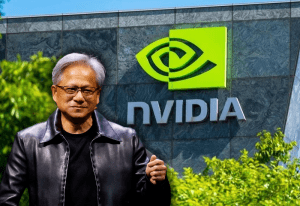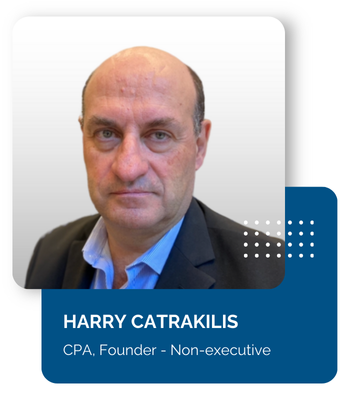The Paradox of Company Growth: Success and the Risk of Mediocrity
- October 2, 2024
- Posted by: Harry Catrakilis
- Category: Blog

Navigating Company Growth: Scale Up Without Sacrificing Standards
This blog touches on the topic of company growth and how success can sometimes breed complacency within a company; a paradox of growth. Harry Catrakilis analyzes the example of Nvidia, a company who has scaled up but maintained its original exceedingly high standards.
“In the modern business world, success often brings with it a unique challenge—how to grow without losing sight of the values that initially built the company. This paradox of company growth can lead businesses, especially as they scale, to compromise their core principles or high standards and slip into mediocrity. It’s easy for a company to allow success to breed complacency, taking on practices that dilute their essence, as they increasingly believe that their size grants them immunity to failure.
A prime example of a company navigating this paradox is Nvidia, a company that has been scrutinized for its intense work culture. In a recent article, Nvidia was described as having a CEO who “tortures” his employees into greatness. The working conditions, according to the article, involve long hours, heated meetings, and a constant drive for excellence. Here’s an excerpt:
“Expect long hours, screaming-match meetings, and a CEO who believes in ‘torturing’ his employees into greatness. In return, you get the chance to be very rich. Young companies light on cash but brimming with potential can attract talent by offering shares on top of a salary, giving employees a personal stake in success. Still, workers described overwork that would make even Wall Street bankers wince—working seven days a week, often past midnight. Nvidia’s staff turnover rate, at 5.3% in 2023, stands well below the industry average of 18%.”
Despite the criticism leveled at Nvidia for its rigorous and even brutal work culture, the company continues to thrive at the forefront of the tech industry by staying true to its principles it was founded upon. Jensen Huang, the company’s CEO, is known for his high expectations, leading a team that is expected to push themselves beyond what many would consider reasonable limits. Nvidia’s approach is one that values perseverance, suffering for one’s craft, and driving employees toward excellence.
This intense approach has garnered its share of negative attention, with critics pointing to the long hours and high expectations as unsustainable or even harmful. However, Nvidia’s ability to retain its top talent speaks volumes. The company’s low staff turnover rate of 5.3%—well below the industry average—suggests that employees remain committed, likely because they see the tangible rewards for their efforts. Regardless of Nvidia’s extreme work environment, the company has avoided the paradox of growth by not allowing its growth to be a shield against repeated mistakes. They continue to attract and retain talent and maintain high standards thanks to Nvidia’s clear merit-based system of reward.
In fact, this model highlights a key element previously discussed in this blog: elevating top performers. Nvidia’s approach, harsh as it is, is negated by Nvidia’s commitment to rewarding hard work with hefty rewards. Employees who push themselves beyond the norm are compensated beyond the norm. The company shows that acknowledging and rewarding top performers fosters loyalty, even in challenging conditions. This is a lesson that growing companies should take to heart: when you create a system that recognizes and rewards hard work that brings excellent results, you ensure that your best employees stay, and that your core values remain upheld.
This lesson might be where some companies fall short and fail to succeed- they emulate Nvidia’s work approach, but can’t compensate their top performers at the impressive level that Nvidia does.
The key lesson from Nvidia’s example is that growth doesn’t have to lead to compromise. Harsh though their work environment may be, Nvidia hasn’t allowed its massive scale to blunt its edge; instead, it uses its growth as fuel for continued innovation and high expectations. They’ve taken a stand against trends that don’t align with their core beliefs, resisting the temptation to adopt practices that might weaken their company’s integrity.
In conclusion, the paradox of growth is a delicate balance between leveraging new resources and staying true to the values that defined your success. Nvidia’s journey illustrates that growth doesn’t have to mean a dilution of standards, and that just because a larger company might be able to take more hits and survive, doesn’t mean they should open themselves up to complacency. Growth should be seen as an opportunity to strengthen, not weaken, the values that built the business in the first place.” -Harry Catrakilis
The above article only intends to provide general information and reflection. It is not designed to provide specific advice or recommendations for any individual. It does not give personalized tax, financial, or other business and professional advice. Before taking any form of action, you should consult a financial professional who understands your particular situation. CKH Group will not be held liable for any harm/errors/claims arising from the blog. Whilst every effort has been taken to ensure the accuracy of the contents, we will not be held accountable for any changes that are beyond our control.
About the Author
Harry Catrakilis has over 30 years of experience in the practice of public accounting, corporate financial management, and investment banking. He was managing partner of CKH from 2003 until summer of 2018 when main operations were passed on to CEO Nico Meyer. This blog was written by and is the candid reflections of Harry Catrakilis.

 “Expect long hours, screaming-match meetings, and a CEO who believes in ‘torturing’ his employees into greatness. In return, you get the chance to be very rich. Young companies light on cash but brimming with potential can attract talent by offering shares on top of a salary, giving employees a personal stake in success. Still, workers described overwork that would make even Wall Street bankers wince—working seven days a week, often past midnight. Nvidia’s staff turnover rate, at 5.3% in 2023, stands well below the industry average of 18%.”
“Expect long hours, screaming-match meetings, and a CEO who believes in ‘torturing’ his employees into greatness. In return, you get the chance to be very rich. Young companies light on cash but brimming with potential can attract talent by offering shares on top of a salary, giving employees a personal stake in success. Still, workers described overwork that would make even Wall Street bankers wince—working seven days a week, often past midnight. Nvidia’s staff turnover rate, at 5.3% in 2023, stands well below the industry average of 18%.”